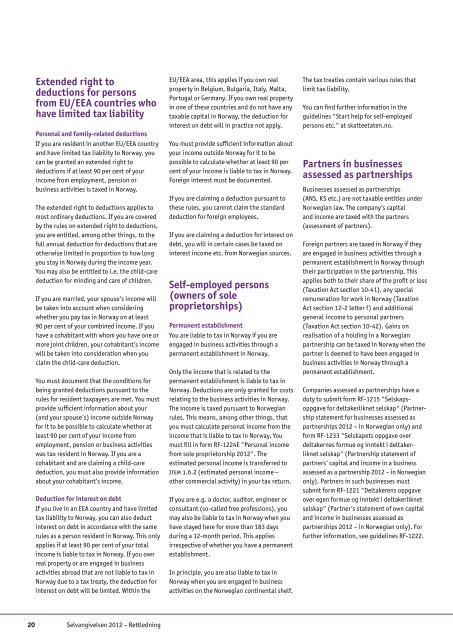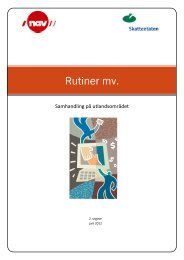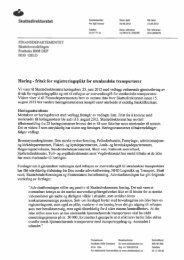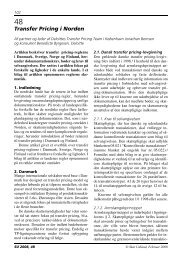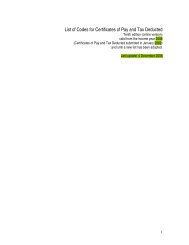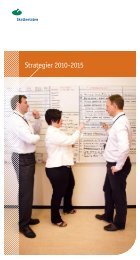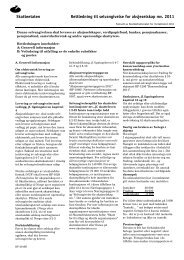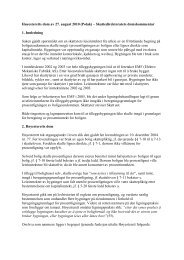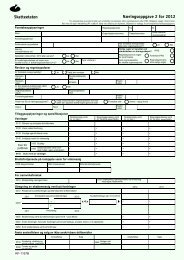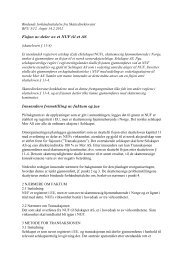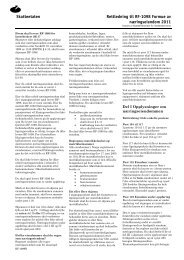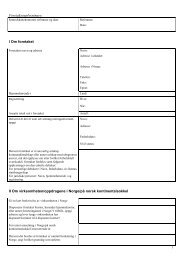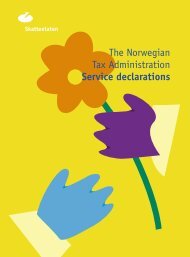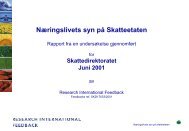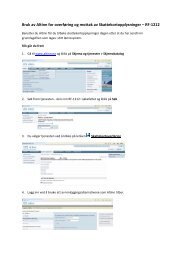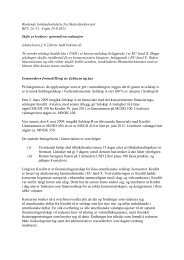Rettledning for utenlandske arbeidstakere og ... - Skatteetaten
Rettledning for utenlandske arbeidstakere og ... - Skatteetaten
Rettledning for utenlandske arbeidstakere og ... - Skatteetaten
Create successful ePaper yourself
Turn your PDF publications into a flip-book with our unique Google optimized e-Paper software.
Extended right to<br />
deductions <strong>for</strong> persons<br />
from EU/EEA countries who<br />
have limited tax liability<br />
Personal and family-related deductions<br />
If you are resident in another EU/EEA country<br />
and have limited tax liability to Norway, you<br />
can be granted an extended right to<br />
deductions if at least 90 per cent of your<br />
income from employment, pension or<br />
business activities is taxed in Norway.<br />
The extended right to deductions applies to<br />
most ordinary deductions. If you are covered<br />
by the rules on extended right to deductions,<br />
you are entitled, among other things, to the<br />
full annual deduction <strong>for</strong> deductions that are<br />
otherwise limited in proportion to how long<br />
you stay in Norway during the income year.<br />
You may also be entitled to i.e. the child-care<br />
deduction <strong>for</strong> minding and care of children.<br />
If you are married, your spouse’s income will<br />
be taken into account when considering<br />
whether you pay tax in Norway on at least<br />
90 per cent of your combined income. If you<br />
have a cohabitant with whom you have one or<br />
more joint children, your cohabitant’s income<br />
will be taken into consideration when you<br />
claim the child-care deduction.<br />
You must document that the conditions <strong>for</strong><br />
being granted deductions pursuant to the<br />
rules <strong>for</strong> resident taxpayers are met. You must<br />
provide sufficient in<strong>for</strong>mation about your<br />
(and your spouse’s) income outside Norway<br />
<strong>for</strong> it to be possible to calculate whether at<br />
least 90 per cent of your income from<br />
employment, pension or business activities<br />
was tax resident in Norway. If you are a<br />
cohabitant and are claiming a child-care<br />
deduction, you must also provide in<strong>for</strong>mation<br />
about your cohabitant’s income.<br />
Deduction <strong>for</strong> interest on debt<br />
If you live in an EEA country and have limited<br />
tax liability to Norway, you can also deduct<br />
interest on debt in accordance with the same<br />
rules as a person resident in Norway. This only<br />
applies if at least 90 per cent of your total<br />
income is liable to tax in Norway. If you own<br />
real property or are engaged in business<br />
activities abroad that are not liable to tax in<br />
Norway due to a tax treaty, the deduction <strong>for</strong><br />
interest on debt will be limited. Within the<br />
EU/EEA area, this applies if you own real<br />
property in Belgium, Bulgaria, Italy, Malta,<br />
Portugal or Germany. If you own real property<br />
in one of these countries and do not have any<br />
taxable capital in Norway, the deduction <strong>for</strong><br />
interest on debt will in practice not apply.<br />
You must provide sufficient in<strong>for</strong>mation about<br />
your income outside Norway <strong>for</strong> it to be<br />
possible to calculate whether at least 90 per<br />
cent of your income is liable to tax in Norway.<br />
Foreign interest must be documented.<br />
If you are claiming a deduction pursuant to<br />
these rules, you cannot claim the standard<br />
deduction <strong>for</strong> <strong>for</strong>eign employees.<br />
If you are claiming a deduction <strong>for</strong> interest on<br />
debt, you will in certain cases be taxed on<br />
interest income etc. from Norwegian sources.<br />
Self-employed persons<br />
(owners of sole<br />
proprietorships)<br />
Permanent establishment<br />
You are liable to tax in Norway if you are<br />
engaged in business activities through a<br />
permanent establishment in Norway.<br />
Only the income that is related to the<br />
permanent establishment is liable to tax in<br />
Norway. Deductions are only granted <strong>for</strong> costs<br />
relating to the business activities in Norway.<br />
The income is taxed pursuant to Norwegian<br />
rules. This means, among other things, that<br />
you must calculate personal income from the<br />
income that is liable to tax in Norway. You<br />
must fill in <strong>for</strong>m RF-1224E "Personal income<br />
from sole proprietorship 2012". The<br />
estimated personal income is transferred to<br />
item 1.6.2 (estimated personal income –<br />
other commercial activity) in your tax return.<br />
If you are e.g. a doctor, auditor, engineer or<br />
consultant (so-called free professions), you<br />
may also be liable to tax in Norway when you<br />
have stayed here <strong>for</strong> more than 183 days<br />
during a 12-month period. This applies<br />
irrespective of whether you have a permanent<br />
establishment.<br />
In principle, you are also liable to tax in<br />
Norway when you are engaged in business<br />
activities on the Norwegian continental shelf.<br />
The tax treaties contain various rules that<br />
limit tax liability.<br />
You can find further in<strong>for</strong>mation in the<br />
guidelines "Start help <strong>for</strong> self-employed<br />
persons etc." at skatteetaten.no.<br />
Partners in businesses<br />
assessed as partnerships<br />
Businesses assessed as partnerships<br />
(ANS, KS etc.) are not taxable entities under<br />
Norwegian law. The company’s capital<br />
and income are taxed with the partners<br />
(assessment of partners).<br />
Foreign partners are taxed in Norway if they<br />
are engaged in business activities through a<br />
permanent establishment in Norway through<br />
their participation in the partnership. This<br />
applies both to their share of the profit or loss<br />
(Taxation Act section 10-41), any special<br />
remuneration <strong>for</strong> work in Norway (Taxation<br />
Act section 12-2 letter f) and additional<br />
general income to personal partners<br />
(Taxation Act section 10-42). Gains on<br />
realisation of a holding in a Norwegian<br />
partnership can be taxed in Norway when the<br />
partner is deemed to have been engaged in<br />
business activities in Norway through a<br />
permanent establishment.<br />
Companies assessed as partnerships have a<br />
duty to submit <strong>for</strong>m RF-1215 "Selskapsoppgave<br />
<strong>for</strong> deltakerliknet selskap" (Partnership<br />
statement <strong>for</strong> businesses assessed as<br />
partnerships 2012 – in Norwegian only) and<br />
<strong>for</strong>m RF-1233 "Selskapets oppgave over<br />
deltakernes <strong>for</strong>mue <strong>og</strong> inntekt i deltakerliknet<br />
selskap" (Partnership statement of<br />
partners’ capital and income in a business<br />
assessed as a partnership 2012 – in Norwegian<br />
only). Partners in such businesses must<br />
submit <strong>for</strong>m RF-1221 "Deltakerens oppgave<br />
over egen <strong>for</strong>mue <strong>og</strong> inntekt i deltakerliknet<br />
selskap" (Partner’s statement of own capital<br />
and income in businesses assessed as<br />
partnerships 2012 – in Norwegian only). For<br />
further in<strong>for</strong>mation, see guidelines RF-1222.<br />
20 Selvangivelsen 2012 – <strong>Rettledning</strong>


